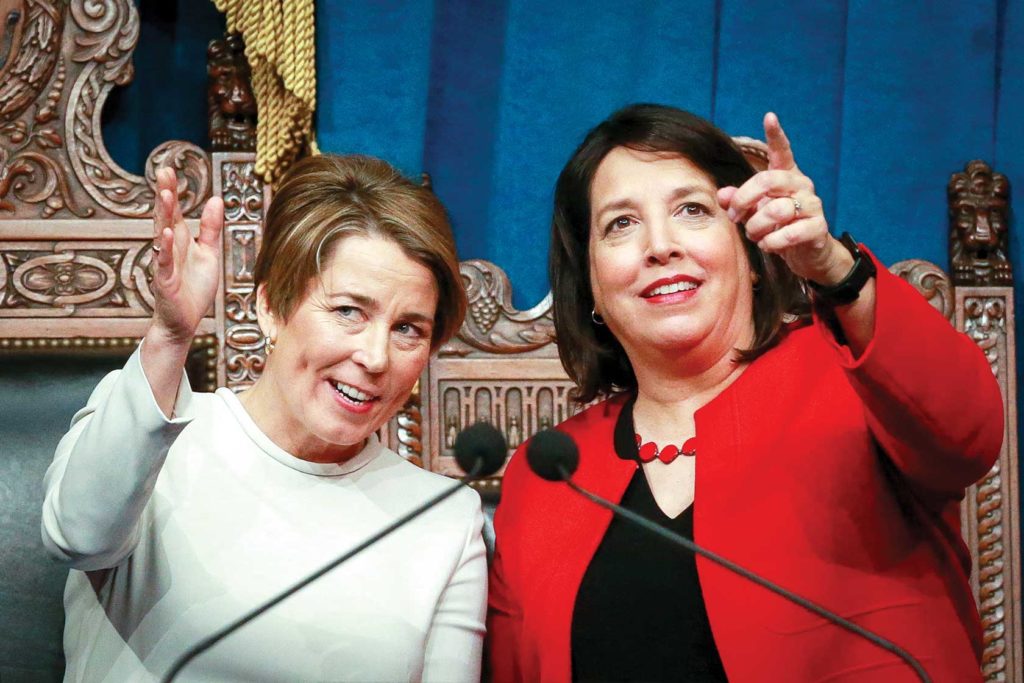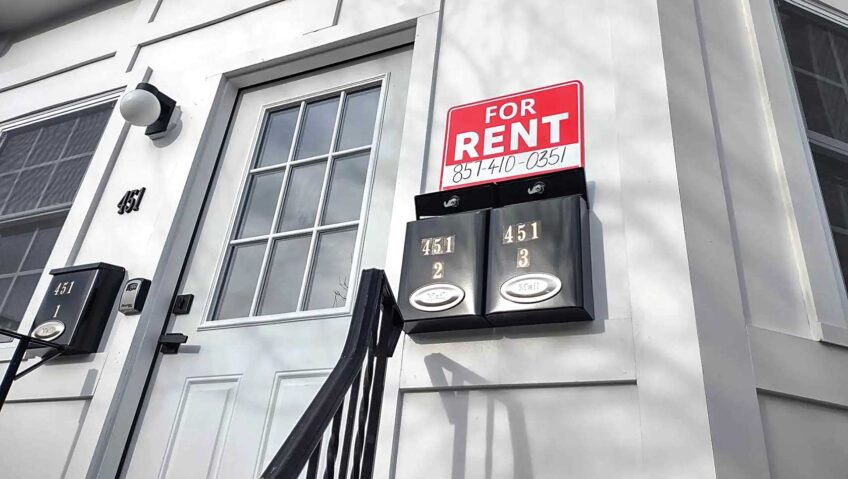Healey lays out agenda for housing, education
Calls for increased housing production, school funding

In her most detailed speech since declaring her candidacy last year, Gov. Maura Healey last Thursday outlined policies and legislative goals her administration plans to pursue, speaking to lawmakers during her swearing-in ceremony in the House chamber.
Healey’s speech outlined a progressive-leaning agenda aimed at increasing educational and career opportunities for Massachusetts residents, regardless of their income level, and decreasing the state’s high cost of housing. She pledged to increase funding for the MBTA and increase diversity and inclusion in state government.
Members of the Legislative Black and Latino Caucus expressed support for Healey’s vision.
“It’s encouraging to hear that the new governor’s agenda is aligned with the things we want to accomplish in this legislative session,” said state Rep. Orlando Ramos of Springfield.
Housing
Healey pledged to increase housing production and affordability, noting that the average rent in Massachusetts is 50% higher than the national average.
“We have to make Massachusetts a place that people can afford to call home,” she said. “Our people can’t realize their dreams until we end the nightmare of high costs.”
The new governor said she has directed her secretary of Administration and Finance, Matthew Gorzkowicz, to identify unused state-owned property and facilities that can be turned into housing within one year.
She also urged local governments to allow greater development around transit hubs and make unspecified changes to zoning law to increase housing stock in Massachusetts. She said her administration would file legislation to expand tax deductions for renters and provide greater assistance for first-time homebuyers.
Child care
Healey said her administration will support so-called Common Start legislation that would provide financial assistance to families seeking child care. Under an existing bill, which has not been passed in the House, families earning up to 125% of the state’s median income — $111,565 for a single parent with one child — would qualify for state child care aid.
Child care providers would also be provided aid to increase salaries.
“Today, let us pledge to be the first state to solve the child care crisis,” Healey said.
Education
Healey said state businesses rely on an educated workforce in Massachusetts but noted that employers are currently struggling to fill positions.
She pledged to create a new fund called MassReconnect that would provide free community college to students over 25 who don’t have a college degree.
“Tens of thousands of jobs in health care, transportation and technology are going unfilled because the skills of our workers don’t match the demands of our economy,” she said.
Healey also pledged to increase funding to the state university system to make earning a degree more affordable.
“What we’re talking about is an investment — and it’s the most precious kind, because it’s an investment in our people,” she said.
She also pledged to fully fund the Student Opportunity Act, the 2019 law that would increase state funding for K-12 education by $1.5 billion, providing greater aid to school districts struggling with the high costs of educating students with special needs, students learning English as a second language and low-income students.

Former governors Michael Dukakis, William Weld and Deval Patrick (far right), former state Auditor Suzanne Bump and U.S. Sen. Ed Markey attend Healey’s inauguration. PHOTO: ANGELA ROWLINGS
Transportation
The state of Massachusetts’ public transit systems, roads and bridges is unacceptable, Healey said. She pledged to appoint a general manager for the MBTA “with deep experience and a laser focus on making our transit safe and reliable.” She also pledged to provide funding to hire 1,000 additional MBTA workers within the first year of her administration and appoint a transportation safety chief charged with inspecting the system.
For the state’s highway infrastructure, she said she would form an interagency taskforce to work on competing for federal funds for repair projects.
“We want to win every available dollar for shovel-ready projects across our state,” she said.
Equity and inclusion
Healey said she will direct all state agencies to conduct a full equity audit.
“Let Massachusetts be the place that shines a light on every systemic barrier, and then does the hard work to break them down,” Healy said. “Because that’s who we are.”
She gave no details on the scope of such audits. Currently representation of people of color varies widely between state agencies.
Caucus members react
State Sen. Lydia Edwards of East Boston said Healey’s commitment to equity is historic.
“A governor is saying we’re not going to build things unless it’s done in the most equitable way,” she said. “That commitment is the first of its kind.”
Edwards cautioned, however, that such audits could stir up thorny issues in state government.
“There’s going to be some hard truths when we’re looking at agencies such as the State Police,” she said.
Currently, people of color make up less than 20% of state troopers and hold no high-ranking positions within the organization.
State Sen. Adam Gomez of Springfield said he would like to hear more details on Healey’s commitment to affordable housing and to allowing rent stabilization in communities where such policies are supported. He noted that Springfield is currently experiencing increased prices amid a housing shortage.
“We’ll see which housing bills she supports,” he said.
Gomez also said he would like to see a commitment to an east-west rail connection that would connect Springfield to Worcester and Boston — a longstanding priority for the Pioneer Valley — as well as a commitment to regional transit authorities that serve communities not served by the MBTA.
Gomez called Healey’s administration a “work in progress,” but said he was happy to witness the historic moment in which the state’s first popularly elected woman governor and first openly gay governor was sworn in.
“I’m very happy to witness it and be a part of it,” he said.







